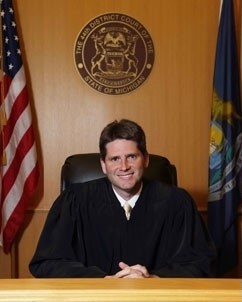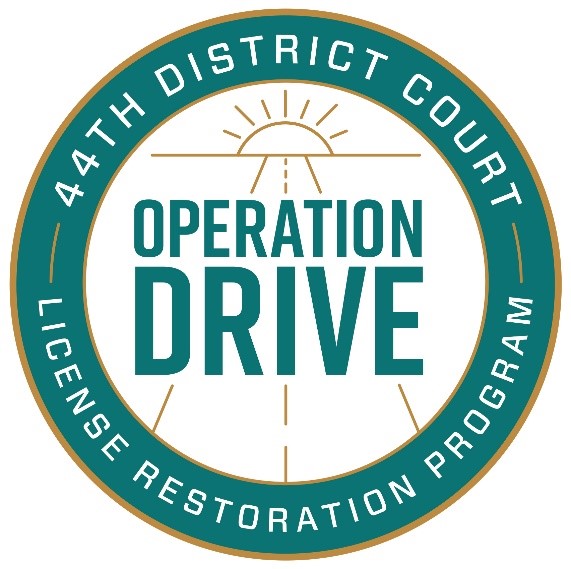Royal Oak chief judge Derek Meinecke discusses Operation Drive, barriers to obtaining a license with CBHJ staff during Lunch & Learn

On Thursday, September 17, the Center for Behavioral Health and Justice hosted a team Lunch & Learn featuring the Honorable Derek Meinecke, chief judge of the 44th District Court in Royal Oak, Michigan. Judge Meinecke was elected to the 44th District Court in November 2012 and was appointed chief judge in October 2014. He previously served as assistant prosecuting attorney for Oakland County where he served as a member of the special victims unit focused on domestic violence, elder abuse, child abuse, and sexual assault.
Since elected to the 44th District Court, Judge Meinecke and co-judge, the Honorable Jamie Wittenberg, have implemented a number of initiatives, including the Justice 101 program, an expansion of Sobriety Court, and Operation Drive, a DWLS (Driving While License Suspended) program to encourage defendants to actively attempt to restore their licenses.
Judge Meinecke was invited to present at the Lunch & Learn by the deputy director of the CBHJ, Liz Tillander, based on his work with Operation Drive. "Our own Dean Kubiak was appointed to serve on the Michigan Joint Task Force on Jail and Pretrial Incarceration. As the task force conducted its public meetings, the data around the top charges at jail admission caught everyone's attention. At least twice I reached out to Judge Meinecke to encourage his continued efforts on Operation Drive and to point out to him that his work is perfectly aligned with the findings and recommendations of the task force."
 In its final report, the Joint Task Force found that traffic offenses accounted for half of all criminal court cases in 2018 with driving without a valid license the third most common reason people went to jail. As a result, one of the final recommendations of the Task Force was to stop suspending and revoking licenses for actions unrelated to safe driving and to reclassify most traffic offenses and some other minor misdemeanors as civil rather than criminal infractions.
In its final report, the Joint Task Force found that traffic offenses accounted for half of all criminal court cases in 2018 with driving without a valid license the third most common reason people went to jail. As a result, one of the final recommendations of the Task Force was to stop suspending and revoking licenses for actions unrelated to safe driving and to reclassify most traffic offenses and some other minor misdemeanors as civil rather than criminal infractions.
To put this issue in context, according to the Task Force report, a driver's license can be suspended for a wide variety of reasons, many unrelated to safety, such as failing to appear in court or conviction for controlled substance offenses. In 2018, nearly 358,000 licenses were suspended for failure to appear and failure to pay fines and fees. These suspensions can lead to arrest or jail if an individual does not appear in court, fully pay fines or fees, or meet any other court conditions.
This issue is of particular importance to the CBHJ. "First, we know that these infractions are often an entrée to the cycle of incarceration, a cycle that once you are in becomes increasingly hard to get out of. Secondly, it's important to understand a district court's ability to address this area and actively divert defendants out of the criminal/legal system," said Tillander.
Since its inception in March of 2016, the 44th District Court has helped restore nearly 900 licenses through Operation Drive using what Meinecke describes as a "three-pronged approach: information, structure, and encouragement". The process can be long and intensive for the court and the defendants, but Meinecke is committed to unraveling the complex web of traffic tickets, warrants, court appearances, and fees and fines that can result from even one traffic stop. In most cases, he is the first and only person invested in providing a defendant with the information they need to actively resolve tickets at various district across the Detroit area.
Judge Meinecke also uses the structure of court to keep defendants moving along in efforts to restore their licenses. When necessary, Meinecke has used MCL Code 771.1 to delay a sentence for up to a year in order to provide more time for a defendant to restore a license. He finds that defendants in his program are usually supportive of this extension because they are motivated by the progress they're making. He also recognizes that some laws seem to do nothing more than serve as an obstacle for an individual to obtain a license. For example, Judge Meinecke discussed MCL 257.303(1)(g)-a component of the Michigan Vehicle Code that prevents an individual who has never had a license and has been found guilty of two moving violations in the prior three years from obtaining a license. Due to this, after working to pay fines and satisfy rulings related to moving violations, individuals with a clear record would then have to wait three years to obtain their license.
Finally, the judge applies a liberal dose of encouragement throughout the program. He sees the frustration faced by the defendants who are trying to address tickets and warrants across the area without the benefit of a license or transportation and with limited financial means.
Those interested may watch Meinecke's Operation Drive docket live on the 44th District Court's You Tube every Thursday.
About the Center for Behavioral Health and Justice: The Center for Behavioral Health and Justice in Wayne State University's School of Social Work envisions communities in which research, data, and best practices are used by multiple stakeholders to enhance the optimal well-being of individuals with mental illness and/or substance use disorders who come into contact with the criminal/legal system. Learn more
About the Michigan Joint Task Force on Jail and Pretrial Incarceration: The Michigan Joint Task Force on Jail and Pretrial Incarceration was established by Governor Whitmer's Executive Order No. 2019-10. The Task Force acted in an advisory capacity with the goal of developing ambitious, innovative, and thorough recommendations for changes in state law, policy, and appropriations to expand alternatives to jail, safely reduce jail admissions and length of stay, and improve the efficiency and effectiveness of Michigan's justice systems. Learn more or sign up for the Task Force newsletter.